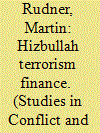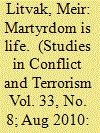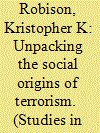|
|
|
Sort Order |
|
|
|
Items / Page
|
|
|
|
|
|
|
| Srl | Item |
| 1 |
ID:
097780


|
|
|
|
|
| Publication |
2010.
|
| Summary/Abstract |
Hizbullah, which has been designated a terrorist entity in several international jurisdictions, depends upon a substantial mobilization of financial resources to support its complex, multi-faceted organizational apparatus, its domestic activities in Lebanon, and its far-reaching transnational operations. This study surveys Hizbullah's resourcing requirements, and examines the role of military assistance from Iran and Syria along with Hizbullah's own reliance on front organizations, clandestine networks, business enterprises, propaganda media, and local exactions to generate funding for operational activities. Particular attention is directed at the diversion of charitable contributions, the exploitation of non-governmental organizations (NGOs), involvement in criminal activities and contraband trade, and the money laundering mechanisms utilized to transfer funds to where they are required. It also reviews efforts by international authorities to staunch the flow of financial resources to terror groups, activities and operations, including their effect on Hizbullah terrorism finance.
|
|
|
|
|
|
|
|
|
|
|
|
|
|
|
|
| 2 |
ID:
097779


|
|
|
|
|
| Publication |
2010.
|
| Summary/Abstract |
Deterring Al Qaeda from using a nuclear weapon, should it acquire one, is a harder challenge than analysts have argued. Suggestions for "deterrence based on punishment" have severe limitations. Al Qaeda is not a state, has no clear command authority, and has no clear nuclear weapons-employment doctrine. Most analysts also ignore the dynamic of "crisis instability" ("use it or lose it"): should the West believe Al Qaeda has an improvised nuclear devise, it is unlikely (regardless of whether Al Qaeda leadership claimed the weapon would be held as a deterrent only) that the West would accept a mutually-assured-destruction relationship with the group. The West would hunt the weapon down, forcing Al Qaeda's hand. The best counter-Weapons of Mass Destruction-Nuclear Terrorism defense, therefore, is good counterinsurgency policy to starve it of recruits until the group dies.
|
|
|
|
|
|
|
|
|
|
|
|
|
|
|
|
| 3 |
ID:
097778


|
|
|
|
|
| Publication |
2010.
|
| Summary/Abstract |
Though fecund as a medium across which subversive ideas can be propagated, the Internet is also hazardous to these ideas. By virtue of the perpetual beta and the increasing under-dominance of Internet content, which effectively means there is no last edit on the Internet, all ideas, including militant ones, are subject to the scrutiny of Internet users. The hazard of the perpetual beta and the new plasticity of information is atomizing the violent militant memes associated with Al Qaeda.
|
|
|
|
|
|
|
|
|
|
|
|
|
|
|
|
| 4 |
ID:
097781


|
|
|
|
|
| Publication |
2010.
|
| Summary/Abstract |
This article analyzes the articulation of the doctrine of "Jihad of the Sword" and martyrdom by the Islamic Resistance Movement of Palestine, Hamas, as a central pillar of Palestinian identity and as a major source of political mobilization and national empowerment. As part of this concept Hamas presents martyrdom as the epitome of jihad and of Islamic belief. The end-goal of jihad is the destruction of Israel and the elimination of the Jews. By emphasizing the centrality of "Jihad of the Sword" Hamas's ideas reveal a certain similarity to, or inspiration by, radical Salafi-jihadist Islamic movements. While Hamas adopted a pragmatic approach on short-term tactics, these doctrines impose constraints on the scope of a profound ideological transformation it can undergo.
|
|
|
|
|
|
|
|
|
|
|
|
|
|
|
|
| 5 |
ID:
097783


|
|
|
|
|
| Publication |
2010.
|
| Summary/Abstract |
The conventional wisdom is that weak and failed states are at great risk of becoming havens for transnational terrorist and guerilla groups. The assumption is that lack of enforcement capabilities enables militant organizations to infiltrate and fill the "vacuum of power" that is created in the absence of a strong state. This article argues, though, that this is only one of the ways in which weak states are attractive to militant groups. It explores the various mechanisms through which the vacuum of power translates into opportunities for such groups. These mechanisms include the easiness of acquiring support and recruitment within refugees or marginalized populations; the ability of the violent non-state transnational organization to establish a "surrogate state" in supplying institutions and services that enhance its public appeal; the relations between civil or communal conflict and the success of such groups; and the use of transnational violent groups as proxies for other states. Using the Palestinian Liberation Organization (PLO) and Hezbollah in Lebanon as the primary cases, as well as two mini-cases from Central America and Africa, the paper illustrates the working of these mechanisms and contributes to our understanding of the relations between state weakness and transnational violent non-state organizations.
|
|
|
|
|
|
|
|
|
|
|
|
|
|
|
|
| 6 |
ID:
097782


|
|
|
|
|
| Publication |
2010.
|
| Summary/Abstract |
The author's prior cross-national research found a negative relationship between the percent of the workforce that is female and terrorism. One explanation of this finding suggests that women are violence-averse and work to mitigate acts of political violence. Alternatively, women in the workforce may simply proxy for an economy with robust employment with fewer grievances or proxy for modernizing forces (e.g., democracy, secularism) that moderate traditionalism. The author examines the relationship between women in the workforce and terrorism and finds that while modernization factors are important, terrorism is nonetheless explained by the unique nonviolent influences of women in public society.
|
|
|
|
|
|
|
|
|
|
|
|
|
|
|
|
|
|
|
|
|